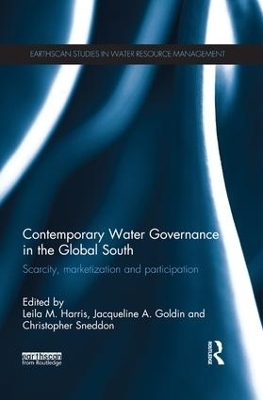
Contemporary Water Governance in the Global South
Routledge (Verlag)
978-1-138-67276-5 (ISBN)
This book focuses on three major concepts and approaches that have gained currency in policy and governance circles, both globally and regionally—scarcity and crisis, marketization and privatization, and participation. It provides a historical and contextual overview of each of these ideas as they have emerged in global and regional policy and governance circles and pairs these with in-depth case studies that examine manifestations and contestations of water governance internationally.
The book interrogates ideas of water crisis and scarcity in the context of bio-physical, political, social and environmental landscapes to better understand how ideas and practices linked to scarcity and crisis take hold, and become entrenched in policy and practice. The book also investigates ideas of marketization and privatization, increasingly prominent features of water governance throughout the global South, with particular attention to the varied implementation and effects of these governance practices. The final section of the volume analyzes participatory water governance, querying the disconnects between global discourses and local realities, particularly as they intersect with the other themes of interest to the volume.
Promoting a view of changing water governance that links across these themes and in relation to contemporary realities, the book is invaluable for students, researchers, advocates, and policy makers interested in water governance challenges facing the developing world.
Leila M. Harris is an Assistant Professor in the Institute for Resources, Environment and Sustainability and in the Institute for Gender, Race and Sexuality and Social Justice at the University of British Columbia. She is also Co-Director of the Program on Water Governance (PoWG). Her work focuses on nature-society questions including inequality and environment and political ecology, particularly through investigation of water politics, access, and governance in the Global South. Jacqueline Goldin is the SADC WaterNet Chair for Water and Society and Associate Professor at the Institute for Water Studies, University of the Western Cape where she heads the Anthropology of Water (AoW) Research Group. The research group focuses on food and water security and the interface between human and ecosystem well-being, with attention to institutional settings as mediators between people and nature. Chris Sneddon is an Associate Professor in the Department of Geography and the Environmental Studies Program at Dartmouth College. His research and teaching focus on conflicts over water at multiple spatial scales, with a primary regional focus on the Mekong River basin of Southeast Asia.
1. Introduction: Interrogating Hegemonic Discourses in Water Governance, Jacqueline A Goldin, Christopher Sneddon and Leila Harris 2. Water, Governance, and Hegemony, Jacqueline Christopher Sneddon 3. Hegemonic Concepts and Water Governance from a Scientific-Engineering Perspective, Lawrence A. Baker 4. Producing Crisis: Hegemonic Debates and Mediations and Representations of Water Scarity, Basil Mahayni 5. Tensions in Narratives and Lived Realities of Water Crisis in Damascus, Basil Mahayni 6. Abundance and Scarcity Amidst the Criss of 'Modern Water': Changing Water- Engergy Nexus in Turkey, Sinan Erensu 7. Water Scarcity and the Colonial State: The Emergence of a Hydraulic Bureaucracy in South-Western Matebeleland, Zimbabwe, 1964-1972, Muchaparara Musemwa 8. Water Life? An Agent of Political Space and Protest? An Instrument of Hegemony?,Uygar Özesmi 9. Water Security in Late-Modernity, Samer Alatout 10. Framing the Debate on Water Marketization, Leila Harris 11. Variable Histories and Geographies of Marketization and Privatization, Leila Harris 12. (Dis)connecting the Flow, Steering the Waters: Building Hegemonies and 'Private Water' in Zambia, 1930s to the Present, Hilary Waters 13. Privatisation of the Urban Water Supply in Kenya: Policy Framework for Pro-Poor Provision, O A K’Akumu 14. Privatisation, Marketization, Commoditization As Dominant Themes in Water Governance: A response, Shiney Varghese 15. Hegemony Does Not Imply Homogeneity: Thoughts on the Marketization and Privatization of Water, Karen Bakker 16. The Participatory Paradigm: Anathema, Praise and Confusion, Jacqueline Goldin 17. Who is a Water User? The Politics of Gender in Egypt's Water User Associations, Jessica Barnes 18. Problems and Prospects for Genuine Participation in Water Governance in Turkey, Zeynep Kadirbeyoglu And Ekin Kurtic 19. Participation's Limits: Tracing the Contours of Participatory Water Governance in Accra, Ghana , Cynthia Morinville And Leila M. Harris 20. Reclaiming Global Citizenship: A Perspective From Catalonial Water Justice Activists, Annelies Broekman 21. Participation, Water And The Edges Of Capitalism, Eric Sheppard 22. Placing Hegemony: Water Governance Concepts And Their Discontents, Christopher Sneddon, Leila Harris And Jacqueline A. Goldin
| Erscheinungsdatum | 29.06.2016 |
|---|---|
| Reihe/Serie | Earthscan Studies in Water Resource Management |
| Verlagsort | London |
| Sprache | englisch |
| Maße | 156 x 234 mm |
| Gewicht | 453 g |
| Themenwelt | Naturwissenschaften ► Biologie ► Ökologie / Naturschutz |
| Sozialwissenschaften ► Politik / Verwaltung ► Staat / Verwaltung | |
| Sozialwissenschaften ► Soziologie ► Spezielle Soziologien | |
| Technik ► Umwelttechnik / Biotechnologie | |
| Wirtschaft ► Volkswirtschaftslehre | |
| ISBN-10 | 1-138-67276-9 / 1138672769 |
| ISBN-13 | 978-1-138-67276-5 / 9781138672765 |
| Zustand | Neuware |
| Informationen gemäß Produktsicherheitsverordnung (GPSR) | |
| Haben Sie eine Frage zum Produkt? |
aus dem Bereich


